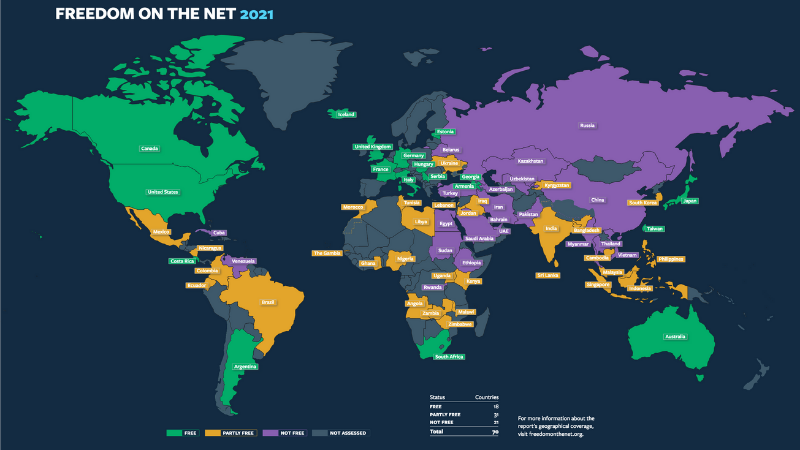Governments’ use of spyware technology is increasing, giving them more capacity to “flout the rule of law and monitor private communications at their discretion,” according to the Freedom of the Net 2021 report published by Freedom House on Tuesday.
Freedom on the Net is a yearly report on human rights in the digital sphere. The authors assess internet freedom in 70 countries which account for 88% of internet users globally.
This year’s report said that authorities in at least 45 out of the 70 countries surveyed are suspected of using spyware or data-extraction technology supplied by companies such as the NSO Group.
This, combined with the unregulated sale of these tools, the power they have and the low cost, has “created a crisis for human rights.”
In 2021, various investigations have laid bare how repressive and not so repressive regimes have monitored journalists and members of civil society.
In its 11th year, the report detailed a continuing decline in internet freedoms across the world. With some 3.8 billion having internet access, findings stated that 75% live in countries where people were arrested or imprisoned for posting political, social, or religious issues.
Some 72% lived in countries where people had been physically attacked or killed for online activities. Over 60% live in countries where authorities deploy pro-government individuals to manipulate online discussions.
Among other issues highlighted in this year’s report was the threat posed against freedom of expression. Freedom House found that in 56 countries, people had been arrested and convicted for their online speech. Some of these included “especially egregious sentences”.
In Iran, Ruhollah Za was executed for “inciting protests and being associated with foreign intelligence” due to his Amad News channel on Telegram. In Egypt, two influencers, Haneen Hossam and Mawada al-Adham, were sentenced to lengthy jail terms for violating human trafficking laws – they had published content that urged women to pursue careers.
In 41 countries, users of the internet faced physical attacks related to their online activities. These included the violent assault of a Dhaka University student for alleged “anti-government activities” on social media. In Azerbaijan, police beat and arbitrarily detained an individual’s home over posts he had made that criticised local government officials.
Some 20 countries shut down the internet last year, and 21 countries blocked social media and communication protests. More often than not, this happened “during times of political turmoil such as protests and elections”.
Several governments also took steps to create laws that would govern how social media platforms manage user-generated content. They include take-down orders, penalties, and the appointment of legal officials to manage state requests.
Freedom House noted: “The most problematic measures may result in increased censorship of political dissent, investigative reporting, and expressions of ethnic, religious, sexual, or gender identity, particularly among marginalised communities.”
The practice of forcing private companies to hand over user data was also observed in at least 38 countries. Freedom House said governments had implemented legal and administrative reforms to control tech companies’ data management.
“Particularly in countries with poor human rights records, domestic data storage significantly expands the potential for surveillance and the risk of abuse,” the report found.
China fared worse in 2021, with a score of just 10 out of a possible 100. Iran and Myanmar joined it in the bottom three.
The most accessible country out of those surveyed was Iceland with 96 out of 100, followed by Estonia (94), Costa Rica and Canada (both with 87), and then France and the UK with 78.
The full report is available here.












